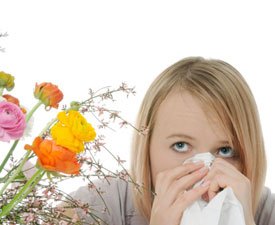
Trees, grasses and wildflowers bloom and flourish in warm weather. But these beautiful seasons can mean misery for allergy sufferers.
Cleveland Clinic is a non-profit academic medical center. Advertising on our site helps support our mission. We do not endorse non-Cleveland Clinic products or services. Policy
When people with inhalant allergies breathe in plant pollens, their bodies release histamine. This triggers allergic rhinitis, better known as hay fever — the cause of all those sneezes, runny noses and itchy eyes.
Hay fever symptoms tend to be worse on dry, warm, windy days, Cleveland Clinic allergist Cristine Radojicic, MD, of the Respiratory Institute, advises. Pollens easily float on the breeze and into sensitive noses.
8 tips for managing symptoms
Most people reach for over-the-counter (OTC) antihistamines to treat their hay fever symptoms. It’s important to choose non-drowsy formulas during the day or when you need to stay alert.
If you want to curb your allergies without medicine, here are tips for staying sneeze-free during hay fever season, says Dr. Radojicic:
Keep your windows closed and use air conditioning if you’re allergic to pollen. Don’t use fans; they can stir up dust. When you’re driving, set the AC to recirculate air.
Filter the air, clean air conditionings vents regularly, and use a high-efficiency particulate air (HEPA) filter if you have a forced-air furnace. Clean air filters frequently and air ducts at least once a year.
Install dehumidifiers to battle mold, which can collect in basements and other areas of the house. Be sure to clean these air-drying devices every week. Air out damp clothes and shoes (in the house) before storing.
Avoid wooded areas or gardens as much as possible. You can still admire nature — from farther away.
Check the forecast, and stay indoors as much as possible on hot, dry, windy days when pollen counts are generally the highest. (They are usually the highest between 5 and 10 in the morning.)
Wear a mask (an inexpensive painter’s mask works) if you must mow the lawn or work in a garden.
Take a shower after outdoor activities to wash off pollen that may have accumulated.
Encourage sports participation for children with allergies or asthma, but inform coaches of medications your child may need to take before activities.
When an allergist can help
If you need more help controlling seasonal allergies, see an allergist, who may prescribe stronger medication than OTC antihistamines. An allergist can also determine whether you have developed asthma as well.
Inhalant allergies sometimes trigger asthma — even if you don’t feel shortness of breath, or tightness in the chest or airways. Controlling the allergy will control the asthma, and symptoms will fade.
More than 50 million Americans are sensitive to at least one allergy-producing substance. That means that allergies affect one in four Americans, and that number is on the rise. So more of us may find ourselves sneezing and sniffling on some of the most beautiful days of the year.
Hi! I am a robot. I just upvoted you! I found similar content that readers might be interested in:
https://health.clevelandclinic.org/2012/08/8-tips-for-coping-with-hay-fever/
Downvoting a post can decrease pending rewards and make it less visible. Common reasons:
Submit
nice good
Downvoting a post can decrease pending rewards and make it less visible. Common reasons:
Submit